- Home
- About FDB
- Product
- Small & Medium Business Loans
- Working Capital Loan
- Horticulture, Grains & Pulses Farming
- Livestock Farming
- Root Crops, Ginger, Vegetable & Fruit Farming
- Farm Development Loan
- Purchase of Farm Land
- Farm House Construction Loan
- Farm Land Sub-division Loan
- Farm Vehicles, Machinery, Implements & Equipment Loan
- Fishing Loans
- Sugar Cane Farming
- Broiler – Small Holder Chicken Farm
- Building Construction
- Commercial Property Loan
- Transport – Freight Purposes
- Commercial Loans
- Purchase of New Vehicles, Plant and Equipment
- Bus Loans
- Minibus Loans
- Taxi Loans
- Beef Farming Loans
- Coconut Farming Loans
- Dairy Farming Loans
- Agriculture Family Loan Facility – Grow As A Family
- Yaubula Term Deposit
- Climate & Eco-Finance
- FDB’s COVID-19 Affected Customer Relief Package
- Rice Mobility Package
- Small and Medium Enterprise Sustainability Package
- Ginger Loan Facility – Agriculture Value Chain
- FDB Loan for Women Entrepreneurs
- Sugarcane Farmers Special Loan Facility
- Locations
- Media
- Education & Feedback
- Home
- About FDB
- Product
- Small & Medium Business Loans
- Working Capital Loan
- Horticulture, Grains & Pulses Farming
- Livestock Farming
- Poultry Farming
- Root Crops, Ginger, Vegetable & Fruit Farming
- Farm Development Loan
- Purchase of Farm Land
- Farm House Construction Loan
- Farm Land Sub-division Loan
- Farm Vehicles, Machinery, Implements & Equipment Loan
- Coconut Farming Loans
- Dairy Farming Loans
- Agriculture Family Loan Facility – Grow As A Family
- Yaubula Term Deposit
- Climate & Eco-Finance
- Rice Mobility Package
- Small and Medium Enterprise Sustainability Package
- Ginger Loan Facility – Agriculture Value Chain
- FDB Loan for Women Entrepreneurs
- Sugarcane Farmers Special Loan Facility
- Dairy Farming Loan- Agriculture Value Chain
- Small & Medium Business Loans
- Working Capital Loan
- Horticulture, Grains & Pulses Farming
- Livestock Farming
- Root Crops, Ginger, Vegetable & Fruit Farming
- Farm Development Loan
- Purchase of Farm Land
- Farm House Construction Loan
- Farm Land Sub-division Loan
- Farm Vehicles, Machinery, Implements & Equipment Loan
- Fishing Loans
- Sugar Cane Farming
- Broiler – Small Holder Chicken Farm
- Building Construction
- Commercial Property Loan
- Transport – Freight Purposes
- Commercial Loans
- Purchase of New Vehicles, Plant and Equipment
- Bus Loans
- Minibus Loans
- Taxi Loans
- Beef Farming Loans
- Coconut Farming Loans
- Dairy Farming Loans
- Agriculture Family Loan Facility – Grow As A Family
- Yaubula Term Deposit
- Climate & Eco-Finance
- FDB’s COVID-19 Affected Customer Relief Package
- Rice Mobility Package
- Small and Medium Enterprise Sustainability Package
- Ginger Loan Facility – Agriculture Value Chain
- FDB Loan for Women Entrepreneurs
- Sugarcane Farmers Special Loan Facility
- Locations
- Media
- Education & Feedback
- Home
- About FDB
- Product
- Small & Medium Business Loans
- Working Capital Loan
- Horticulture, Grains & Pulses Farming
- Livestock Farming
- Poultry Farming
- Root Crops, Ginger, Vegetable & Fruit Farming
- Farm Development Loan
- Purchase of Farm Land
- Farm House Construction Loan
- Farm Land Sub-division Loan
- Farm Vehicles, Machinery, Implements & Equipment Loan
- Coconut Farming Loans
- Dairy Farming Loans
- Agriculture Family Loan Facility – Grow As A Family
- Yaubula Term Deposit
- Climate & Eco-Finance
- Rice Mobility Package
- Small and Medium Enterprise Sustainability Package
- Ginger Loan Facility – Agriculture Value Chain
- FDB Loan for Women Entrepreneurs
- Sugarcane Farmers Special Loan Facility
- Dairy Farming Loan- Agriculture Value Chain
- Small & Medium Business Loans
- Working Capital Loan
- Horticulture, Grains & Pulses Farming
- Livestock Farming
- Root Crops, Ginger, Vegetable & Fruit Farming
- Farm Development Loan
- Purchase of Farm Land
- Farm House Construction Loan
- Farm Land Sub-division Loan
- Farm Vehicles, Machinery, Implements & Equipment Loan
- Fishing Loans
- Sugar Cane Farming
- Broiler – Small Holder Chicken Farm
- Building Construction
- Commercial Property Loan
- Transport – Freight Purposes
- Commercial Loans
- Purchase of New Vehicles, Plant and Equipment
- Bus Loans
- Minibus Loans
- Taxi Loans
- Beef Farming Loans
- Coconut Farming Loans
- Dairy Farming Loans
- Agriculture Family Loan Facility – Grow As A Family
- Yaubula Term Deposit
- Climate & Eco-Finance
- FDB’s COVID-19 Affected Customer Relief Package
- Rice Mobility Package
- Small and Medium Enterprise Sustainability Package
- Ginger Loan Facility – Agriculture Value Chain
- FDB Loan for Women Entrepreneurs
- Sugarcane Farmers Special Loan Facility
- Locations
- Media
- Education & Feedback
News Release FDB Strengthens Climate Financing Policy Knowledge for Staff

FDB Announces FDB’s Yaubula Term Deposit Product
July 19, 2018
News Release FDB Calls for Climate Action to be Strategic, Not Mere Voluntary
August 31, 2018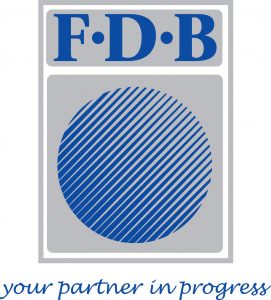
News Release
FDB Strengthens Climate Financing Policy Knowledge for Staff
The Fiji Development Bank [FDB] today (24.08.18) concluded a two-day Green Climate Fund [GCF] Awareness Session for staff to strengthen their knowledge capacity on the GCF, its requirements, climate financing, and the science behind climate change.
Chief Executive Officer, Mr. Mark Clough, said the GCF Awareness Session captured discussions on the science behind climate change by Professor Elisabeth Holland of the University of the South Pacific and increased internal policy knowledge for staff relating to the Fund.
“To generate high quality proposals for climate finance investments in low emission and climate-resilient projects and programmes, we need to first empower our people with knowledge about the impacts of climate change backed by the science behind it, about the Bank’s GCF accreditation conditions and features and how the portfolio would be operationalized within the existing structure,” he said.
“How GCF is relevant to Fijians and FDB staff and what are the climate positive outcomes of that relevance is the question that we are asking our staff to think about,” said Mr. Clough.
The session was delivered internally, complemented by inviting Professor Holland as a guest speaker, and policy consultants the Bank has engaged through its USAID Ready Project.
“We had the opportunity to hear firsthand that global warming is unequivocal and is no longer debated in the scientific community,” said Mr. Clough.
Professor Holland, who is also the Director of the Pacific Center for Environment and Sustainable Development (PaCE-SD), USP, provided an understanding of the science behind climate change.
She said because Fiji is such an economic hub of the pacific, “the decisions made by you all will affect the rest of the Pacific”.
Professor Holland said that there is an opportunity for FDB and PaCE-SD to collaborate to share the science and achieve sustainable development by making informed investment and financing decisions.
She said there could be a shared understanding when it comes to risk frameworks.
“We look at these weather and climate events and we look at the vulnerability and the exposure to determine the risk, both climate and disaster risk. Then we look at how that influences development and what we can do to reduce the risk,” she said.
She said that FDB and PaCE-SD could forge common thinking about risk, giving it more layers of understanding in dialogue.
Day two of the session was devoted to two critical new policies, the Procurement Policy and the Gender Equity and Social Inclusion (GESI) Policy.
The United States Agency for International Development [USAID], through its Ready Project, is assisting the Bank in progressing its Green Climate Fund [GCF] accreditation requirements with these two policy developments.
Two USAID Ready Project consultants, Ms. Akosita Drova and Ms. Colleen Peacock-Tautai, have developed these policies.
“We are grateful to Professor Holland for adding to the knowledge of our team and to USAID for its assistance,” said Mr. Clough.
“Selected participants – our FDB-GCF Champions- from all our branches and unit centers convened at the Head Office for the Awareness Session to better comprehend the GCF, its functions and expectations of the Bank as an accredited entity,” said Mr. Clough.
“With changes in our policy sphere to reflect GCF requirements, the session included awareness on five new policies, namely, the Disclosure Policy, Insider-Trading/Anti-Money Laundering/Terrorism Policy, Revised Complaints Policy, Procurement Policy and the GESI Policy,” said Mr. Clough.
-ENDS-
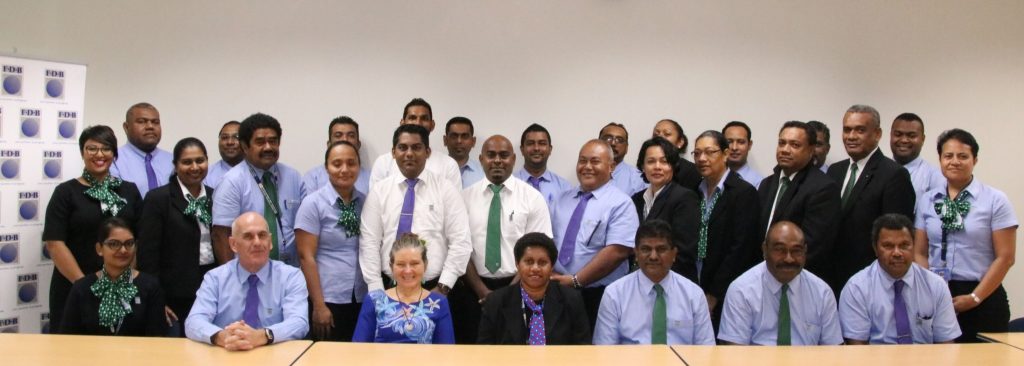
FDB-GCF Champions with Professor Elisabeth Holland of the University of the South Pacific at the Green Climate Fund [GCF] Awareness Session Day 1, at FDB Head Office in Suva.
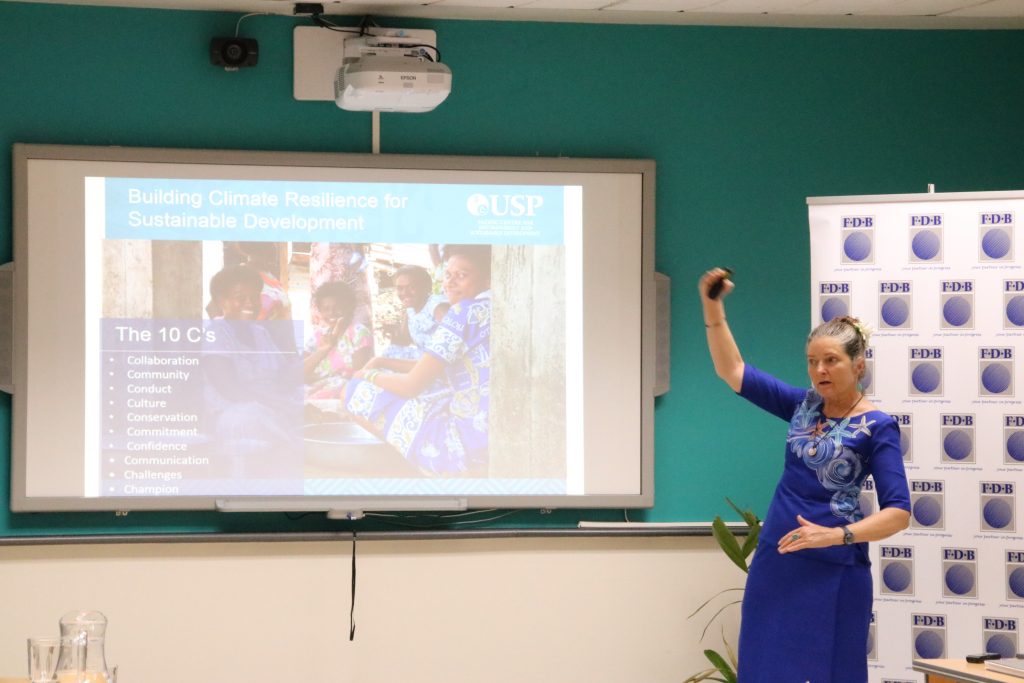
Professor Elisabeth Holland of the University of the South Pacific at the FDB Green Climate Fund [GCF] Awareness Session Day 1, at FDB Head Office in Suva.
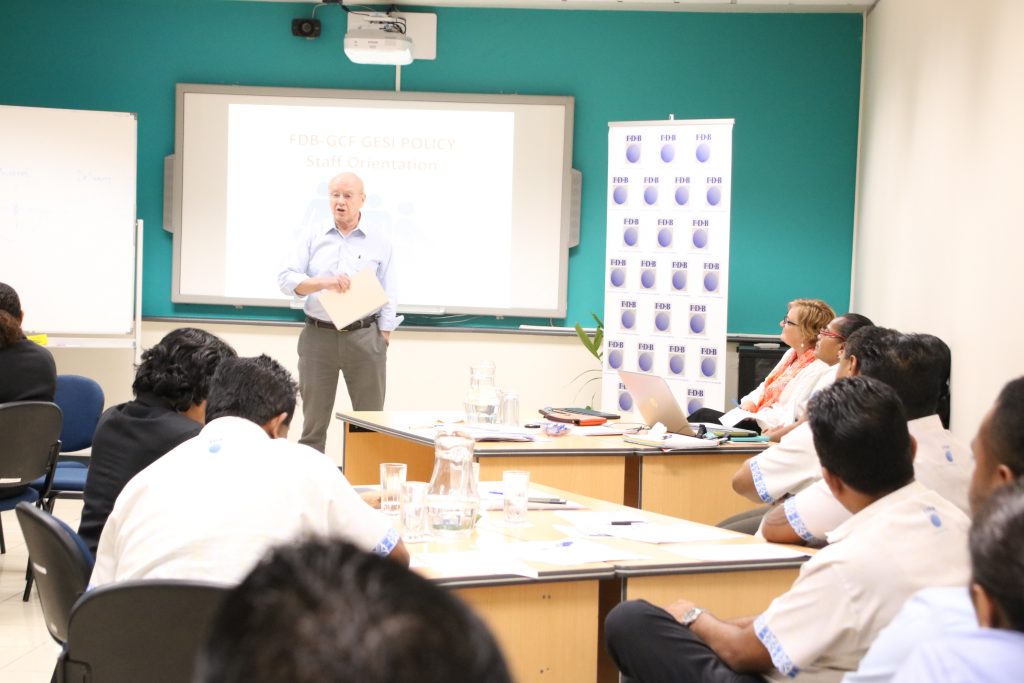
Mr Lee Baker, Chief of Party, USAID Ready Project addressing participants.The United States Agency for International Development [USAID], through its Ready Project, is assisting the Bank in progressing its Green Climate Fund [GCF] accreditation requirements with these two policy developments.
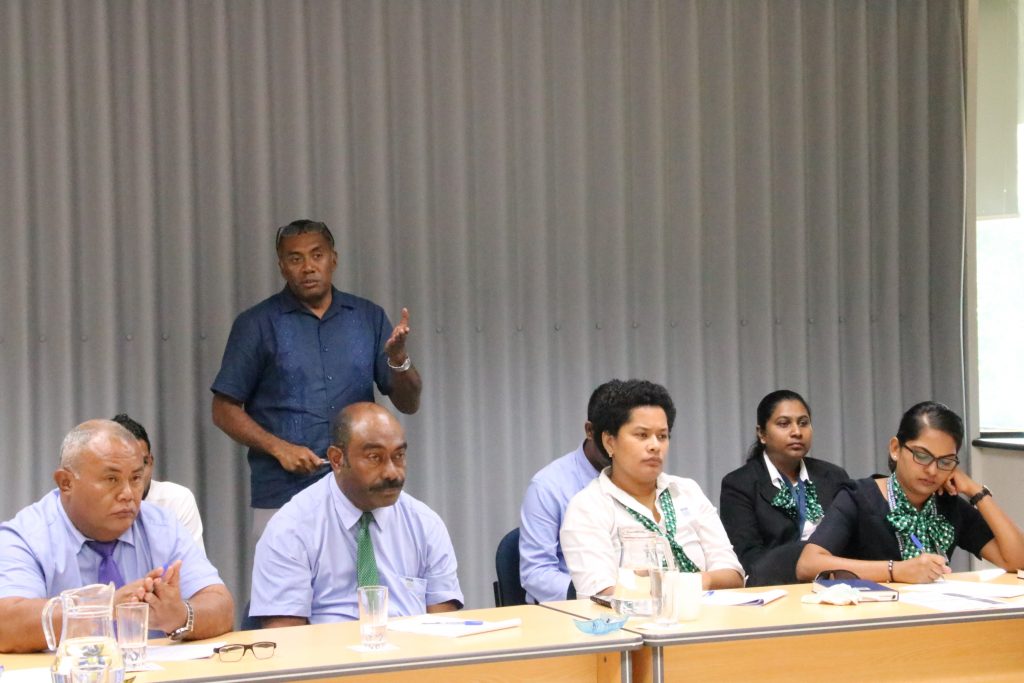
Mr. Noa Seru Fiji & Regional Coordinator, USAID Ready Project addressing participants at the FDB GCF Awareness Session.
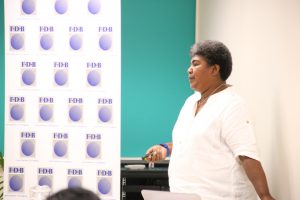
USAID Ready Project consultant, Ms. Akosita Drova has developed the Bank’s Procurement Policy
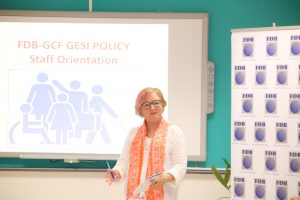
USAID Ready Project consultant Ms. Colleen Peacock-Tautai has developed the Bank’s Gender Equity and Social Inclusion (GESI) Policy
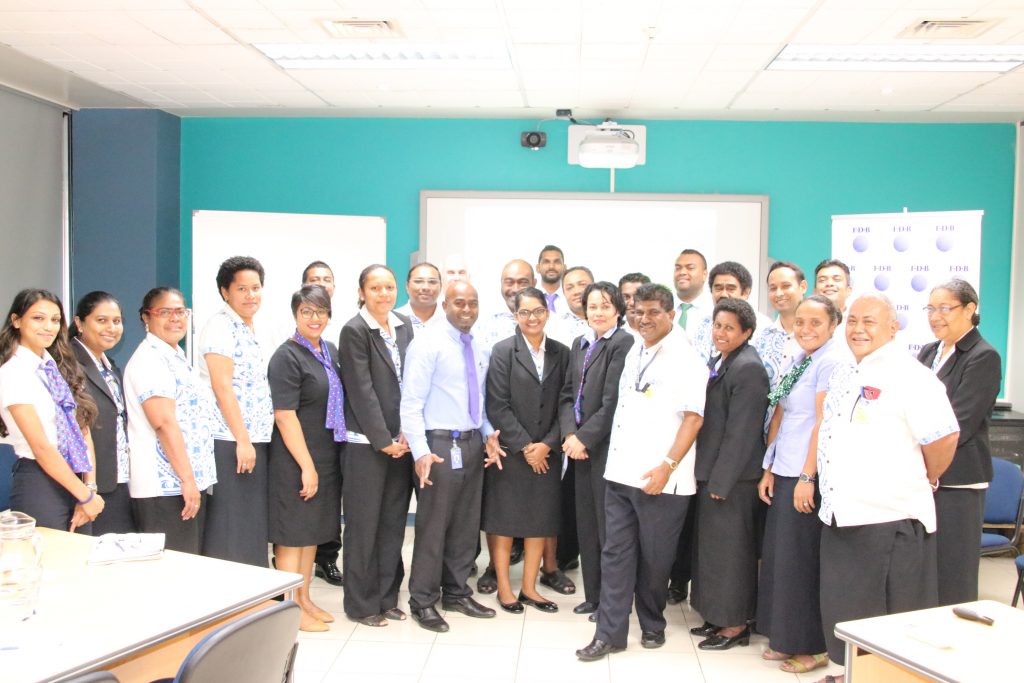
FDB-GCF Champions after the conclusion of a a two-day Green Climate Fund [GCF] Awareness Session for staff to strengthen their knowledge capacity on the GCF, its requirements, climate financing, and the science behind climate change.
Date: 24 August 2018
For media enquiries, please contact:
Media & Community Relations Officer, Parijata Gurdayal

